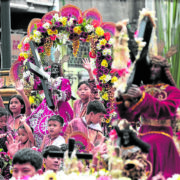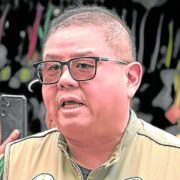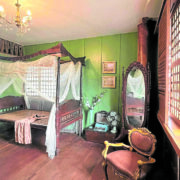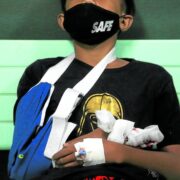‘Parasite’ filmmaker’s secret debut unearthed by new docu
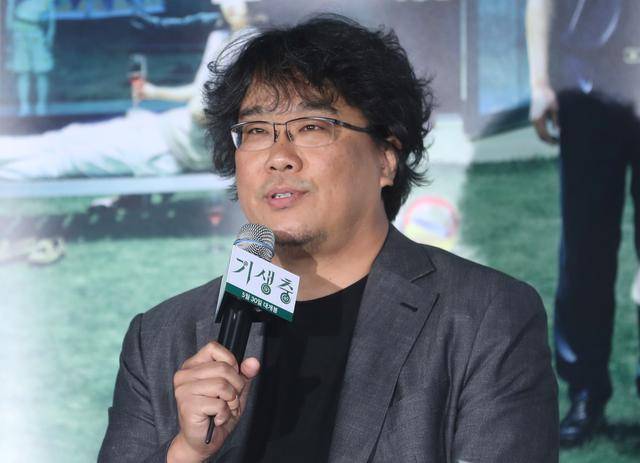
SEOUL—Oscar-winning “Parasite” filmmaker Bong Joon-ho’s first movie—about a trapped gorilla dreaming of a different life—was hidden from the world for three decades, but a new documentary has brought it to light.
“Yellow Door: ‘90s Lo-fi Film Club” showcases Bong’s formative years as an obsessive film enthusiast and aspiring filmmaker, as well as a group of quirky young South Korean cinephiles who came together in the early 1990s.
This cohort—dubbed “Yellow Door” for the color of their office entrance—included both Bong and the documentary’s director, Lee Hyuk-rae.
Until this year, only Yellow Door members had ever seen Bong’s debut film, “Looking for Paradise,” which features a stuffed gorilla locked in a basement, fantasizing about a real banana tree and battling excrement that comes to life as a worm.
Bong made the film in his own basement in 1992 and screened it for Yellow Door members later that year, turning bright red with nervousness.
The film is seared in the memories of the club’s other members.
“I believe that the essence of Bong Joon-ho’s films today can be traced back to that gorilla,” Choi Jong-tae, one of the members, says in the documentary.
In an interview with AFP, Lee said he was deeply inspired by Bong’s amateur debut, and revisiting it in light of the film director’s subsequent rise to global prominence was a key motivation for making the documentary.
“When the (final) twist was revealed in the movie, everyone present there really felt a heart-pounding sensation,” he said of the 1992 screening.
“As Bong continued to accomplish things that were beyond our imagination at the time, my desire to watch his debut film (again) grew increasingly intense.”
Trailblazer
One of the most recognizable figures in South Korean cinema, Bong made history in 2020 by becoming the first director from his country to win an Academy Award for his powerful satire of inequality, “Parasite.”
He was already well-known then for his dark and genre-hopping thrillers, including the 2006 monster blockbuster, “The Host,” and the 2003 crime drama, “Memories of Murder.”
But Lee’s documentary captures an earlier era of South Korean cinema, when the country’s films were obscure overseas and local cinephiles were seeking new content to expand their horizons.
Lee said members of Yellow Door were mostly stuck viewing poor-quality VHS tapes, which in the case of foreign films came without subtitles.
But they happily watched anyway, because they were desperate.
Bong religiously collected VHS tapes, and he meticulously analyzed Francis Ford Coppola’s 1972 classic, “The Godfather,” by sketching cartoons of its scenes.
The documentary—currently streaming on Netflix — captures light-hearted and youthful moments from the film group’s early days, including blurry photographs that members took of each other.
“We were a film group and the photographs (we took) were out of focus,” Bong says in the documentary.
Bong majored in sociology at university and many members of the group had no formal training in cinema.
One member described the cohort as “social misfits.”
Yellow Door’s origins
Lee said many members of the group had been involved in student activism in the 1980s against South Korea’s then-authoritarian government, but felt adrift following Seoul’s political liberalization in the 1990s.
“It seems like people who were wandering aimlessly, unsure what they wanted to do but acutely aware of the places they didn’t want to be, fortuitously encountered each other … at the Yellow Door,” Lee told AFP.
In a way, the trapped protagonist in Bong’s first movie embodied what the cohort was feeling at the time, he added.
Since then, Bong’s signature films—including “Parasite,” “Snowpiercer” and “The Host”—have featured basements as spaces symbolic of repression, violence and dark secrets.
Yellow Door members have since followed diverse professional paths, spanning cinema, speech therapy, education and academia.
But cinema has always held a special significance for Bong, Lim Hoon-ah, one of the members, says in the film.
“To me, cinema was a romantic (fantasy), but (Bong) Joon-ho really thought of it as his reality,” she said.—AFP
AFP is one of the world's three major news agencies, and the only European one. Its mission is to provide rapid, comprehensive, impartial and verified coverage of the news and issues that shape our daily lives.




